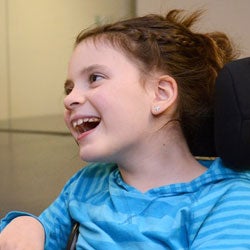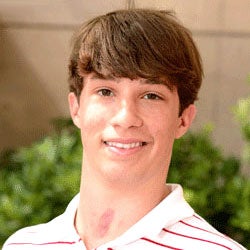Our Children

Erica Wilson
In the course of a single day, Erica Wilson went from being an active 12-year-old who loved to dance to being told she would never walk again.
On Feb. 23, 2010, Erica was playing basketball in her Physical Education class at Childersburg Middle School when she suddenly experienced what felt like an intense cramp in her lower right calf. The soreness quickly extended up her leg and down to her toes, and by the time she arrived at the Children’s of Alabama emergency department, she was screaming in pain.
“It felt like somebody was squeezing the muscles from the inside out,” Erica said.
Within four hours, pediatric neurologist Jayne Ness, M.D., diagnosed Erica as having transverse myelitis, an inflammation of the spinal cord that can cause sudden and permanent paralysis in the legs. And while the diagnosis stunned Erica and her family, the fact that she learned what was wrong so rapidly turned out to be crucial for her recovery.
“Most children aren’t diagnosed with this until days or even weeks after it happens,” Erica said. “For Dr. Ness to diagnose me that quickly was super important, because without that I wouldn’t have been able to start rehabilitation so soon. I was in Children’s for nearly six weeks and did physical, occupational and recreational therapy there. When I left Children’s, I was a lot stronger than when I first got there.”
There were, of course, some difficult days along the way. Erica had a hard time accepting that she never would be able to dance again. She desperately needed some way to channel her pent-up energy. So one day her occupational therapist suggested they go watch a wheelchair basketball game at The Lakeshore Foundation. The suggestion introduced the athletic teenager to a new sport and gave her new direction.
“It was one of those days where I felt defeated,” Erica said. “So instead of my normal exercises, Anya wanted to take me to something fun. She’s the one who motivated me to start looking towards playing sports. It’s been an outlet for me emotionally and physically. Without Anya’s help, I would be in a much different place right now.”
Erica plans to attend college, become a recreational therapist and use her personal experience to help children with disabilities improve their lives. And she wants to continue playing wheelchair basketball.
“Throughout her rehabilitation, Erica has demonstrated a real commitment to do whatever is required to get better,” said Drew Davis, M.D., who specializes in rehabilitation medicine and is one of Erica’s doctors. “She has made a successful transition from being a patient to being an active participant in her life.”

Jacob Browder
Like many teenage boys in the smaller towns of Alabama, Jacob Browder’s life was filled with friends, school, football -- and the rodeo. “He has always been a cowboy,” his mother, Susan, said. “He has always had a heart for rodeo.”
He started bull riding at age 13 and participated in 12 competitions, including the Youth World Finals in Texas the summer of 2013. That prestigious event draws competitors from all over the globe and only the best are invited to participate.
Bull riding requires the rider to hold onto the harness with one hand and keep the other hand free while staying astride the bull for eight full seconds. It’s not an easy task and requires a great deal of regular practice. “The only way you can get better is to get on them,” Jacob’s dad, Nicky, said.
It was during one of those practice rides in September 2014 that Jacob’s life nearly ended. Just a few seconds into the practice ride in a private arena in Fitzpatrick, Alabama, Jacob was thrown and head-butted by the bull. He lay in a motionless heap, knocked cold from the impact. And he didn’t wake up. Despite a lack of phone service, emergency medical personnel arrived at the arena and airlifted Jacob to a hospital in nearby Montgomery. Preliminary tests revealed a broken jaw and a much more serious concern, a traumatic brain injury. He was immediately flown to Children’s of Alabama for specialized care.
Two and a half weeks later, Jacob had still not regained consciousness, was on a ventilator to help him breathe, and his prognosis was dim. But after another two weeks in the hospital, he was removed from the vent and began breathing on his own. At that point, his family and his care team felt the determined young man had turned a corner in his recovery and he began making steady functional progress. Jacob, or “J.B.” as he prefers to be called, was moved from the pediatric intensive care unit to a regular floor.
“I don’t remember anything about the night of the accident,” J.B. said. “When I woke up in the hospital, I couldn’t move or say anything. I kept telling myself that it was just a dream.”
Because his brain was so severely bruised, another two weeks passed before Jacob could speak, eat or swallow. His brain had forgotten how. Over the next month, though, Jacob slowly regained motor skills through intense physical therapy, speech therapy and occupational therapy. “I can remember the day J.B. first blew his duck call after his accident,” Paola Mendoza, M.D. “Although he still could not find his words and had to relearn how to speak and walk, the determined hunter and bull rider in him came out naturally. His family’s constant support and positivity and his unsinkable spirit were truly an inspiration to witness.”
J.B. credits Dr. Mendoza, Dr. Drew Davis and other members of his care team for the progress he’s made, as well as his family. “My mom is my biggest fan and biggest motivator,” he said. “Without her and God, I wouldn’t be here today.”
Jacob still undergoes therapy at Children’s and is committed to a grueling workout at home. He is all caught up in his schoolwork and looks forward to graduating from high school. He finds encouragement through his favorite Bible verse, Deuteronomy 31:6 -- Be strong and courageous. Do not fear or be in dread of them, for it is the LORD your God who goes with you. He will not leave you or forsake you.
“We still have bumps in the road,” Nicky said, “but God has placed the people in front of us that we need to help us on this journey.”
Christopher and Christian Little
Like all moms who anticipate the firsts in their children's lives, Nicole Selders waited anxiously for her twin boys, Christopher and Christian Little, to say their first words and take their first steps. "I kept noticing delays in their development," Selders said.
When they were just over a year old, the boys' pediatrician referred them to the Division of Pediatric and Rehabilitation Medicine at Children's of Alabama. "During their physical exam, we noticed some discrepancies in what a normal 13 month old would do. Christian was not crawling and we noticed some subtle preferences for his left hand, preferences we don't expect in a 13 month old. Christopher also was not crawling and we noticed some tightness in his ankles," said Dr. Paola Mendoza.
MRI testing showed scarring indicating the boys might previously have experienced bleeding in their brains. "They had MRIs and the nurse called me the same day with the results. She said they were fairly similar and that the boys had mild cerebral palsy," Selders said.
"When they were diagnosed with cerebral palsy, they qualified for a new array of services including early intervention and out-patient therapy services," Mendoza said.
The twins receive in-home therapy services from United Cerebral Palsy's Hand-in-Hand early intervention program, as well as therapy at Children's on 3rd Outpatient Center. "I've noticed they were fast progressing because within the year they were really picking up with their words and walking pretty well. They've also had excellent carry-over with the parents with therapy," Mendoza said.
"I feel like we caught them in time for early intervention and now they are pretty much typical for two-year-olds," Mendoza said. The twins will continue to receive therapy and physicians will monitor them for any additional complications, she added.
"They are like normal two year olds. They love books and toys and they like to dance. If I ever get down, I just have to look at them because they are a joy," Selders said.
Selders says she is appreciative not only of the medical care her boys have received, but also of the support the medical staff has given her. "If it weren't for all of the people at Children's, I wouldn't know what to do, so I thank them. I thank everybody who has helped me with my babies, because without them I wouldn't have known where to turn," she said.

Sarah and Rebekah Brown
In May 2014 sisters Sarah and Rebekah Brown suffered traumatic brain injuries in an automobile accident in Huntsville, AL. Nine-year-old Sarah was immediately airlifted to Children's of Alabama in Birmingham, while 7-year-old Rebekah remained in Huntsville until doctors there felt she could be transported.
"Sarah had multiple fractures all over her body, especially her face, and a broken ankle. Rebekah stayed in Huntsville in a coma with a drain in her head and on a ventilator. It wasn't safe to transport her to Birmingham until the drain was removed," said the girl's mother, Ryann Brown.
A month later, Rebekah was transferred to Birmingham to join her sister. As their other injuries began to heal, both girls were placed under the care of Dr. Paola Mendoza, a physician in Children's Division of Rehabilitation Medicine.
"Sarah had a severe traumatic brain injury, but she really bounced back with only some signs of amnesia that resolved within three months of her hospital stay," said Mendoza. Sarah has been released from therapy services and is doing well in her classes at school.
Rebekah's brain injury caused more severe complications. "Originally, we thought it was likely she might not be able do much. She had to learn to roll over and to sit up and she is still being fed by a tube," her mother said. Rebekah attends weekly therapy sessions at Children's. "She is in a wheelchair but she has started to take steps in a gait trainer. She is able to move her own legs in that and hold her head up and she is smiling and laughing," Brown said.
She is also learning to use an eye-controlled communication device that will enable her to communicate more easily with her family and therapists. "We are really excited about that," Brown said.
"Usually no matter how bad a patient looks in the ER, we don't know their functional outcome until at least a year after their injury. It's less than 10 months after the accident and we are seeking slow and steady signs of Rebekah's progress," Mendoza said.
"I think with Rebekah this has been a real team effort," Mendoza said. "She has had her family and so many people in occupational therapy, physical therapy, speech therapy and homebound services to advocate for her and her needs."
Ryann Brown is appreciative of the care and support they have received at Children's. "We are so grateful for the doctors, especially in Rehab Medicine. We feel like they really care about our kids. They are so warm and so patient and we really feel that they allow us to be a part of the team," she said.

Walker McCain
Before May 26, 2011, 17-year-old Walker McCain was an all-star cross-country runner for Mountain Brook High School. But the race of his life began on that day after he flipped over the handlebars of his bicycle, slid almost 75 feet and struck his head on a large rock.
"I had gone over to a friend’s house that afternoon because my dad had suggested I go running," Walker recalls. "But I chose to ride my bike instead. The one bad choice I made was walking past two helmets in our basement on the way to my bike."
Walker’s C-3 vertebra was fractured and he suffered extensive brain injuries in the wreck. He was taken to UAB where doctors fitted him with a halo to stabilize his neck injury and placed him on a ventilator.
Walker’s parents, Amy and Byron, were devastated. In an email to friends a few days after the wreck, Byron wrote: "I am trying to find some sense in why this happened and I am lost. I am trying to believe this is a race God says Walker has to run and there is a purpose for this challenge.
"At track meets, we push our children to catch the next runner, break a personal best time, finish the race or maybe even win the race. To each person who reads this message, we need you to do your part to encourage Walker to win this race. He HAS to win this race."
As weeks passed and Walker lay unconscious and heavily sedated, his parents had to decide where their son should continue his recovery. After touring three rehabilitation facilities, they chose Children’s of Alabama as the best place for Walker to receive inpatient therapy.
"Our decision to place Walker in the care of Children’s and its rehab specialists was absolutely the correct decision," Byron says today. "The inpatient treatment provided to Walker was first class, and the follow-up outpatient therapy through Children’s South kept him moving forward so he could start school in mid-August with his fellow students."
"We cannot say enough nice things about Dr. Drew Davis (medical director for the Division of Pediatric Rehabilitation Medicine at Children’s) and the physical, occupational and speech therapists," Amy adds. "They were all wonderful and put Walker through his paces."
Keeping Walker in Birmingham where his friends could visit him on a daily basis also contributed to the success of his rehab, according to his parents. "Walker was very fortunate to have a group of about six friends who visited him daily," Byron says. "They became a part of the recovery process by giving him someone to show his improvement to each day. We were also blessed by an army of parents who are our friends. They helped by staying with Walker in the hospital during the day and also by lending us their support and encouragement."
Walker was transferred from UAB to Children’s of Alabama on June 13 – and on that very day, he began to regain consciousness. Rev. Susan Clayton, associate pastor at Independent Presbyterian Church, who visited with the McCains almost every day of Walker’s hospitalization, happened to be there at the time.
"Byron asked Walker several questions and he answered them all correctly," she recalls. "He answered in one-word responses, and his speech was slow and somewhat slurred, but he was talking! He responded to Byron's ‘I love you’ with an ‘I love you, too.’ ‘Walker is in there,’ I remember thinking. ‘He is on his way.’"
Walker’s recovery continued, and he was released from Children’s on June 24. At a follow-up visit a week later, his neurosurgeon told the McCains he expected their son would make a 100% recovery – and soon it became apparent that Walker would be ready to start school with his classmates. "I used a race analogy at the beginning of all this – and it is unbelievable how many people have cheered for Walker," Byron said at the time. "Starting school is like entering the stretch run to the finish line."
Today, almost two years after the wreck, victory truly is in sight for Walker. He is a freshman at the University of Alabama and he runs again now for exercise. His recovery is nearly complete, although his right hand still tires a bit more easily than before his accident.
He also has become a huge proponent of bicycle safety. "He stops people on campus who are riding a bicycle without a helmet,’ tells them what happened to him and encourages them to wear a helmet," Amy says. "He also congratulates people he sees riding a bike with a helmet!"
Walker says it’s all about helping others avoid the types of injuries he suffered. "My parents tell the story about when I first regained consciousness – how after they asked me a question, they would turn around and cry after each answer," Walker says. "I really can’t imagine how much stress it put on everyone to have to deal with something like that.
"Doctors said that had I been wearing a helmet, the majority of things that happened to me would not have happened – most likely would not have broken my neck, lost consciousness or lost a whole summer. The one thing I tell people now is: ‘Wear your helmet – no matter what.’ Some people make think it’s un-cool, but it really can save your life."










